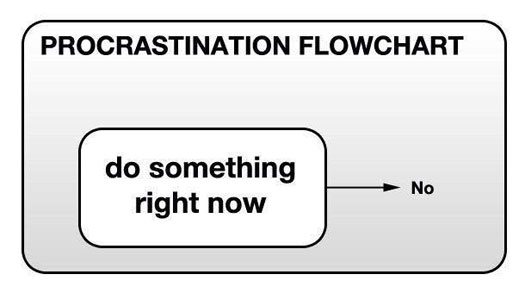
July 21, 2017; New York Times
In many nonprofits, we do not have the luxury of procrastination. Let’s face it: Late grant applications, forgotten 990 reports, and neglected donor communications do not make for a great base of operations. Since it’s best to get a handle on any tendencies in that direction, we thought we might do a quick sum-up of a recent gathering of researchers on the topic.
A write-up in the New York Times about the 10th Procrastination Research Conference, held last Thursday, said the event drew 60 participants, grateful for the chance to discuss the subject with other similarly serious-minded researchers. “I’ve never been in another conference where people didn’t laugh or snicker when I announced what the title of my talk was,” said Joel Anderson, a philosophy professor from Utrecht University in the Netherlands.
“I’ve always made the argument that everybody procrastinates but not everyone’s a procrastinator because everybody may put off a task but that doesn’t make you a procrastinator,” said Dr. Joseph R. Ferrari, the conference organizer, who is himself evidently not a procrastinator, having penned around 70 papers on the topic. And indeed, all present agreed it was a serious problem, affecting 20 percent of the population, a proportion that apparently remains relatively consistent across national borders, thus transcending mere culture.
And, of course, the wages of procrastination can be very serious. Stephan Förster, a psychologist at the University of Münster, spoke, along with other participants, of its toll: broken marriages, lost jobs, deflated dreams, financial disarray, and self-esteem issues. For nonprofits, that might translate into lost tax status, public embarrassment, and suspended contracts. As I mentioned, that’s no joke.
Sign up for our free newsletters
Subscribe to NPQ's newsletters to have our top stories delivered directly to your inbox.
By signing up, you agree to our privacy policy and terms of use, and to receive messages from NPQ and our partners.
But what does the research say?
“Mostly that we need more consistent research,” said Wendelien van Eerde, a professor at the faculty of economics and business at the University of Amsterdam and a coauthor of a metaanalysis of studies on interventions for procrastination.
In fact, those present at the conference spent a good amount of time debating the definition of procrastination, which may or may not be considered to be a case in point. One definition from Joel Anderson, the Dutch philosopher, is, “Culpably unwarranted delay.” Koroush Dini, a psychoanalyst, comments, “I like this, yeah. I think it’s one of the best definitions out there.”
Characteristically, Dr. Ferrari provided a more thorough definition of procrastination as “the purposive and frequent delay in beginning or completing a task to the point of experiencing subjective discomfort, such as anxiety or regret.”
And who wants that?—Ruth McCambridge













